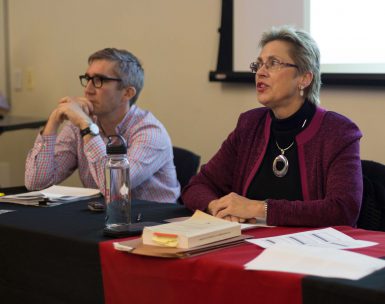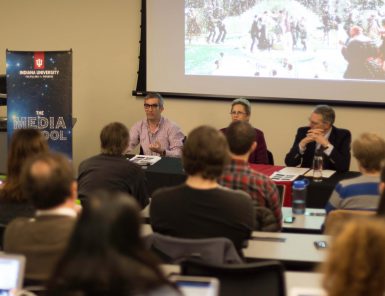Media School professors break down net neutrality as debate intensifies

Net neutrality is like throwing a house party, assistant professor Julien Mailland said at a panel discussion Thursday evening.
He set up the metaphor by asking the audience to imagine they rented a house to throw a party. The landlord, however, decides to hire a bouncer and charge partygoers $5 to come in. This situation is similar to internet service providers charging more money to use certain services, such as Netflix or Hulu.
“It’s a problem because it hinders innovation,” Mailland said.
Three Media School professors discussed net neutrality at a panel put on by The Media School, IU’s cybersecurity program and the Ostrom Workshop Program on Cybersecurity and Internet Governance. Kelley School of Business professor Scott Shackelford moderated the event.
Mailland was joined by professor Barbara Cherry and senior lecturer and state representative Matt Pierce to discuss what the net neutrality battle is and what it means.
Net neutrality is the principle that internet service providers treat all data the same and do not discriminate or block certain services. In the next few weeks, the Federal Communications Commission will vote on whether to repeal net neutrality or not.
Mailland spoke on the history of net neutrality and what exactly net neutrality is. He explained that if net neutrality were eliminated, ISPs could have the option to block certain services and make the internet more closed than it is now, similar to that in the 1980s United States. During that time, internet providers discriminated against certain content.
“As a result, there was very little content on the internet, because it was curated,” Mailland said.
He said this could lead to providers such as Comcast blocking certain streaming services to force its customers to purchase a cable TV package with Comcast.
Cherry went on to discuss the policy issue of net neutrality. She described three different battles happening right now: a legal battle, an economic battle and a political battle.
“The net neutrality debate as it’s being played out in the United States is quite literally war,” Cherry said.
She said the FCC is still trying to figure out whether broadband is considered a telecommunications service or an information service. What kind of service it is will determine what kinds of business models internet service providers can use.

In 2015, the FCC, then operating under a Democratic majority, defined broadband as a telecommunications service, disallowing ISPs to discriminate and block certain services. The FCC, now with a Republican majority, wants to define broadband as an information service, meaning that ISPs could have the freedom to choose when, where and how services are provided.
“The consequences are very far-reaching,” Cherry said.
Given the current situation, many people are probably asking, “What’s next?” Cherry said that if net neutrality is repealed, the next step is to try to appeal the decision.
If the FCC does repeal net neutrality, which Pierce said seems likely given the 3-2 Republican majority, then different “policymaking theaters of war” will be created. He said there are three different places where political battles could take place: the courts, Congress and the states.
He said what will most likely happen is a court battle. Those who disagree with the FCC’s decision of eliminating net neutrality can go to court and argue that its decision was arbitrary and capricious.
The FCC can’t constantly change its mind or make things up on the fly, Pierce said.
Another place where this could be fought is in Congress.
“Congress controls the power of the FCC,” Pierce said.
Since Republicans currently hold the majority in Congress, one might think they would want to repeal net neutrality that way. However, with an election year coming up, most representatives do not want to get involved with this issue, Pierce said.
Even if net neutrality is eliminated, Pierce said the consequences won’t all happen right away. Comcast, most likely, will not automatically get rid of Netflix, for example.
“I think it’ll be more subtle,” Pierce said. “They’ll ease into it.”
For now, Pierce urged students to stay involved in local politics and to keep watching what happens with upcoming decisions.

